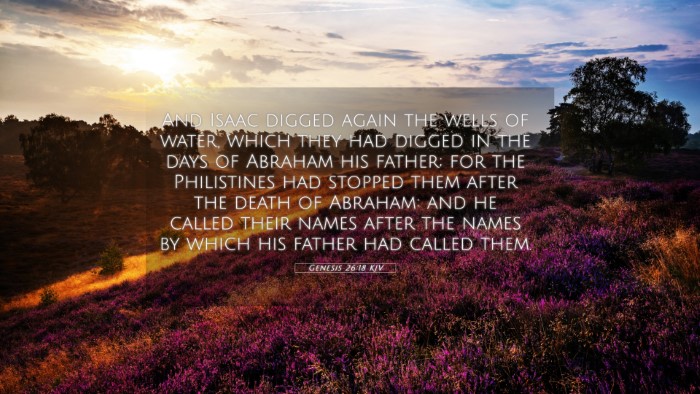Understanding Genesis 26:18
Genesis 26:18 states: "And Isaac digged again the wells of water, which they had digged in the days of Abraham his father; for the Philistines had stopped them after the death of Abraham: and he called their names after the names by which his father had called them."
Verse Meaning and Interpretation
This verse is rich in significance, particularly in the context of heritage, persistence, and the reclaiming of spiritual blessings.
Insights from Public Domain Commentaries
-
Matthew Henry:
Henry emphasizes the act of Isaac reopening the wells as a representation of restoring the blessings and heritage left by Abraham. This act signifies not merely a physical endeavor but a profound spiritual longing for continuity and faithfulness to God's promises.
-
Albert Barnes:
Barnes notes that the Philistines' actions in stopping the wells speak to human opposition to God's promises. Isaac's resolve to dig again points to a believer's persistence in reclaiming God's gifts in the face of challenges.
-
Adam Clarke:
Clarke elaborates on the historical and cultural significance of wells in ancient times as vital sources of life. By identifying these wells by their original names, Isaac honors his father's legacy and acknowledges the blessings God provided through Abraham.
Key Themes
- Heritage: The importance of a spiritual legacy, as seen through Isaac's connection to Abraham.
- Restoration: The act of digging the wells again symbolizes reclaiming what is rightfully ours in the faith.
- Perseverance: Isaac's determination to re-establish his father's work serves as an example for modern believers to persist in their faith.
Cross References
Genesis 26:18 relates to several other Scriptures, showcasing thematic connections throughout the Bible:
- Genesis 21:25: Abraham's previous disputes over water sources illustrate the importance of wells as life-giving resources.
- Genesis 24:63: Isaac’s spiritual practice of meditation in the fields, emphasizing his connection with his father's legacy.
- Numbers 20:17: The Israelites' need for water echoes the significance of wells as sources of sustenance.
- John 4:14: Jesus speaks of living water, a spiritual analogy to the physical water wells, enhancing the theme of divine sustenance.
- Matthew 5:6: The beatitude regarding hunger and thirst for righteousness highlights the desire for spiritual fulfillment akin to seeking water.
- 2 Corinthians 4:8-9: Paul speaks of perseverance through trials, a parallel to Isaac's experiences.
- Hebrews 11:9-10: The faith of Isaac, Abraham, and Jacob illustrated as they sought a heavenly city; a testament to the family's enduring legacy.
Conclusion
Genesis 26:18 serves not merely as a historical account but as a profound connection to the themes of faith, heritage, and perseverance. The act of Isaac reopening the wells stands as a powerful example for believers, encouraging us to reclaim the blessings bestowed upon us, reminiscent of our spiritual forebears. Understanding this verse through the lens of inter-Biblical dialogue enriches our insight into the text and invites deeper reflection on our own journeys of faith.
Further Study - Tools for Cross-Referencing
To explore further connections, consider utilizing:
- Bible concordance
- Bible cross-reference guide
- Cross-reference Bible study resources
Final Reflections
In studying Genesis 26:18 and its context through comparative Bible verse analysis, we can better understand the spiritual applications of Scripture. As we seek to dig our own wells of faith, may we remain persistent and faithful, nurturing the legacies we inherit and those we pass on.







